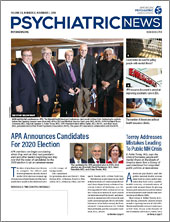Treatment that promotes recovery, not merely crisis stabilization, is the generally accepted standard of care for treatment of mental and substance use disorders, according to a district court ruling this year in the landmark case David Wit, et al., v. United Behavioral Health (
Psychiatric News).
Yet internal company documents show that financial considerations consistently influenced decisions about authorization of care for the plaintiffs, said attorney Caroline Reynolds, Esq. She spoke about the ruling at a conference celebrating the 100th anniversary of The Austen Riggs Center last month in Stockbridge, Mass. Specifically, the documents indicate that the company sought to mitigate the financial costs of complying with federal parity regulations by narrowly interpreting the regulations to focus on treatment of acute symptoms only, Reynolds told participants at the conference.
“One of the things that makes this case unique is that we went to court and proved what the standards of care were by relying on experts, and we showed how UBH’s guidelines fell short of that standard, including by an overemphasis on acuity,” she said. “We were able to prove that financial considerations had infected the decision-making process and that people from the company’s finance department were participating in the [writing of internal guidelines] to reduce benefit expense. And they were kept regularly apprised of the company’s performance.”
Reynolds discussed the finer details of a February 28 decision by the United States District Court for the Northern District of California that United Behavioral Health (UBH/Optum), the country’s largest managed behavioral health care organization, illegally denied coverage for mental and substance use disorders based on flawed medical necessity criteria.
The suit was filed under ERISA (not the Mental Health Parity and Addiction Equity Act) and claimed breach of fiduciary duty and wrongful denial of claims. The case was brought by 11 named adult and adolescent patients who had sought coverage for mental health and/or substance abuse treatment in a variety of settings—residential inpatient, intensive outpatient, and outpatient. After class certification, the case represented more than 50,000 UBH enrollees, involving some 67,000 claims for coverage, Reynolds said.
She said expert testimony—including that of APA Trustee Eric Plakun, M.D., medical director and CEO of Austen Riggs, and Marc Fishman, M.D., co-editor of the substance use treatment guidelines developed by the American Society of Addiction Medicine (ASAM)—established that generally accepted standards require, among other things, treatment of underlying conditions and services to maintain function, not only alleviation of current symptoms; treatment of co-occurring conditions; and treatment at the least intensive level of care that is both safe and effective.
Reynolds said those standards also called for health plans to determine treatment duration based on individual needs and to make level-of-care decisions based on a multidimensional assessment, such as the ASAM Criteria or the Level of Care Utilization System (LOCUS) criteria.
But Reynolds, quoting from the court ruling by Judge Joseph C. Spero, said that “internal UBH communications … make it crystal clear that the primary focus in the guideline development process … was the implementation of a ‘utilization management’ model that keeps benefit expenses down by placing a heavy emphasis on crisis stabilization and an insufficient emphasis on the effective treatment of co-occurring and chronic conditions.”
Said Reynolds, “We also had a document that we really felt was a smoking gun, demonstrating that UBH was considering its medical necessity guidelines as a tool to mitigate the effect of the parity act. That’s really important to think about.”
Reynolds also said UBH documents showed that UBH clinicians who recommended a change to company guidelines to reflect more accurately the standards of care relating to applied behavioral analysis (a long-established treatment for autism) were told to “be more mindful of the business implications of guideline change recommendations.”
Similar pressures were at work in the company’s refusal to use the ASAM Criteria when determining the medical necessity of treatment for substance use disorders. Quoting from the decision, Reynolds noted that “UBH rejected the recommendation of its clinicians with respect to the use of ASAM Criteria because it could not be sure that use of the ASAM Criteria would not increase benefit expenses.” UBH documents showed that UBH did not adopt the ASAM Criteria because its finance department was unable to model how coverage of the therapy would affect costs. “Just that much was enough to kill it,” Reynolds said.
Reynolds’ comments came on the second day of the Austen Riggs conference, a theme of which was that the focus on short-term crisis stabilization had contributed to the current mental health crisis including escalating rates of suicide and opioid addiction. Plakun said the Wit ruling and the bipartisan Mental Health Parity Compliance Act now before Congress provide “room for optimism.” The compliance act requires health plans to be transparent about how well they comply with requirements of the Mental Health Parity and Addiction Equity Act.
“Sunlight is the best disinfectant,” Plakun said. “The goal of mental health and substance use treatment is recovery, not crisis stabilization. There is now a basis for that in the laws of the nation, and that’s important.” ■
The decision in
David Wit, et al., v. United Behavioral Health can be accessed
here.

